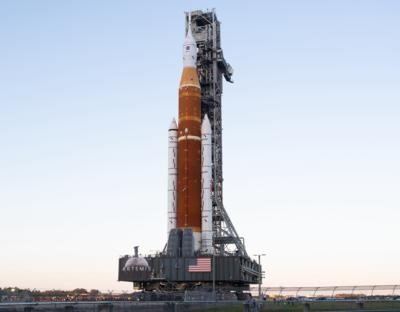Tue, Sep 27, 2022
Tropical Storm Ian Precludes 27 September Liftoff
The launch of Artemis I—the inaugural mission of NASA’s five-flight Artemis lunar program—has been postponed for a third time. The most recent postponement is attributed to concerns over Tropical Storm Ian, which is making its way northwest at a rate likely to see it near enough Florida’s Cape Canaveral area to pose unacceptable risk to United Launch Alliance’s SLS Rocket on its planned, 27 September launch date.

After meeting on Saturday, 24 September, and electing to scrub the launch, NASA flight directors instructed ground personnel to prepare the SLS rocket-stack to be removed from launch-pad 39-B and rolled back into the Kennedy Space Center’s Vehicle Assembly Building (VAB)—the 129,428,000-cubic-foot structure in which NASA engineers and technicians integrate boosters and spacecraft into cohesive vehicles and stack them onto mobile launch platforms in preparation for crawler transport to one of the Cape’s three launch-pads.
By dint of atmospheric data provided by the U.S. Space Force, the National Hurricane Center, and the National Oceanic and Atmospheric Administration, Artemis Program officials will presently render their final decision to either return the SLS rocket to the Vehicle Assembly Building or leave it to ride out the storm on the launch-pad. Should NASA brass so choose, the process of rolling the rocket back inside the VAB would commence late Sunday (25 September), or early Monday (26 September). Once underway, the crawler by which the SLS is transported can take up to ten-hours to make the 4.2-mile (6.8-kilometer) trip from launch-pad 39-B back to the VAB.
Left upon the launch-pad, the SLS rocket stack is capable of withstanding winds up to 85-miles-per-hour (74.1-knots). However, once saddled-up on a crawler and enroute the VAB, the SLS cannot survive winds higher than 46-miles-per-hour (40-knots).

Despite NASA officials having identified an early October launch window for the star-crossed Artemis I mission, it remains unlikely that a new launch date will be formalized until the pending rollback decision has been made. In a press release, NASA stated: “The agency is taking a step-wise approach to its decision making process to allow the agency to protect its employees by completing a safe roll in time for them to address the needs of their families while also protecting for the option to press ahead with another launch opportunity in the current window if weather predictions improve.”
Among the more interesting limitations by which the Artemis I launch is constrained is a prohibition against flying through precipitation. Subject limitation is designed to circumvent the SLS encountering natural lightning, or engendering rocket-triggered lightning strikes—both of which can cause damage to the SLS and endanger public safety. Rocket-triggered lightning forms when a large launch vehicle flies through an atmospheric electric field of sufficient strength to generate a static discharge.
More News
Aero Linx: International Federation of Airworthiness (IFA) We aim to be the most internationally respected independent authority on the subject of Airworthiness. IFA uniquely combi>[...]
Ultrahigh Frequency (UHF) The frequency band between 300 and 3,000 MHz. The bank of radio frequencies used for military air/ground voice communications. In some instances this may >[...]
A Few Questions AND Answers To Help You Get MORE Out of ANN! 1) I forgot my password. How do I find it? 1) Easy... click here and give us your e-mail address--we'll send it to you >[...]
From 2019 (YouTube Edition): Learning To Paint Without Getting Any On Your Hands PPG's Aerospace Coatings Academy is a tool designed to teach everything one needs to know about all>[...]
Also: Sustainable Aircraft Test Put Aside, More Falcon 9 Ops, Wyoming ANG Rescue, Oreo Cookie Into Orbit Joby Aviation has reason to celebrate, recently completing its first full t>[...]
 ANN's Daily Aero-Linx (05.06.25)
ANN's Daily Aero-Linx (05.06.25) ANN's Daily Aero-Term (05.06.25): Ultrahigh Frequency (UHF)
ANN's Daily Aero-Term (05.06.25): Ultrahigh Frequency (UHF) ANN FAQ: Q&A 101
ANN FAQ: Q&A 101 Classic Aero-TV: Virtual Reality Painting--PPG Leverages Technology for Training
Classic Aero-TV: Virtual Reality Painting--PPG Leverages Technology for Training Airborne 05.02.25: Joby Crewed Milestone, Diamond Club, Canadian Pilot Insurance
Airborne 05.02.25: Joby Crewed Milestone, Diamond Club, Canadian Pilot Insurance




